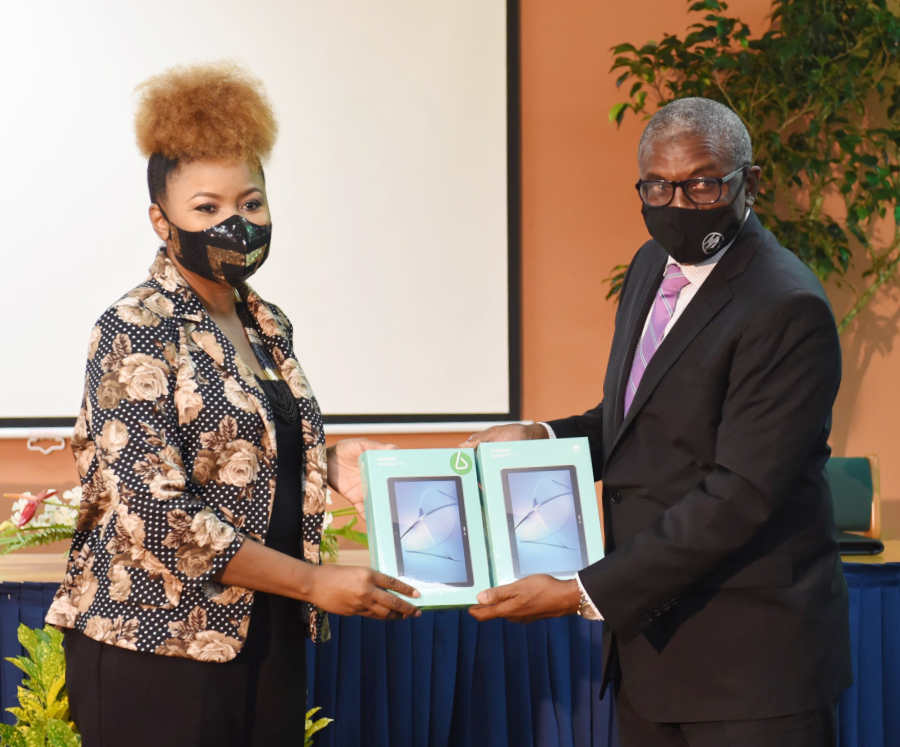
Above: Education Minister Dr Nyan Gadsby-Dolly and TATT chairman Gilbert Peterson at the presentation of tablets. Photos courtesy TATT.
BitDepth#1280 for December 17, 2020
On November 12, the Telecommunications Authority of Trinidad and Tobago (TATT) issued a notice on its Facebook page that it had allocated $15,144,975 (VAT and Customs duties exclusive) for the purchase of ICT devices (the ceremony showed tablet computers) “for students of public schools in Trinidad and Tobago.
Digicel and TSTT will procure the devices and provide related Internet services under terms that were not disclosed.
Questions to the Authority about the arrangement got answers that did not address any of the core issues (questions and responses here) with this unprecedented use of the Universal Service Fund (USF).
TATT is the regulatory body with direct responsibility for managing spectrum in Trinidad and Tobago as well as the operations of telecommunications companies.
The authority has no business getting involved in corporate social responsibility initiatives because its very specific role includes oversight of appropriately practiced CSR in the telecoms sector.
In its response to my questions about the use of the fund, TATT stated that it took “immediate actions to ensure each student had access to the tools needed to participate in the ‘new online educational system’.”
The scope of TATT’s operations is defined by the related regulations of the Telecommunications Act, Chapter 47:31 and nowhere in that legal scope is there an option for the authority to spend $15m on personal devices for school students.
The Ministry of Education has been gathering and distributing devices to needy school students, but has announced no regime for the management of these devices beyond simple donation.
Under the People’s Partnership laptop distribution programme, the parents of students signed a contractual obligation to return the devices at the end of the student’s time at the institution.
It was never enforced, and the only devices that were returned to schools were the ones that were broken.

According to TATT, the regulations allow it to provide tablets to “public schools” under a “Mandatory Universal Service Initiative” requirement to drive “Provision of public access modes nodes and other related equipment to basic telecommunications services to be made available at all” as cited in the regulations.
But these tablets are not public access nodes, and they are not being given to public schools.
There is one exception cited in the public procurement regulations, and it is quite specific, “Special provision of approved assistive technology for persons with disabilities to support use of basic telecommunications services.”
In that instance, the regulations requires a detailed report on each individual to whom the device is given and to whom service is granted.
Is the Education Ministry providing this information to TATT?
The USF, which is a tax on concessionaires approved to operate by the authority, is meant to deliver Internet access in areas where it is unprofitable to supply it.
In underserved areas, the Authority can subsidise telephone service and Internet bandwidth of undetermined speed by up to 40 per cent of commercial rates.
TATT is also governed by procurement rules, which require a competitive bidding and tendering process that is supposed to be documented and accessible to the public.
In response to questions about that requirement of the Act, the authority’s formal response suggested that since USF projects are only open to concessionaires, it had fulfilled that obligation by allowing both mobile networks to participate.
TATT did not explain why other operators delivering fixed broadband with WiFi access were not given an opportunity to participate.
That is not open tendering and is, at best, an avoidance of the procurement requirement that also fails to push accountability for the purchasing process to the operators.
TATT is governed by procurement rules, which require a competitive bidding and tendering process that is supposed to be documented and accessible to the public.
TATT is fully aware of the difference between buying computing devices and encouraging widespread Internet accessibility, having reared up in a press release issued on November 20 to shout down a TT Guardian editorial that dared to suggest that it was not pursuing the provision of Internet access to students at Brasso Venado, pointing out that it was “about to provide coverage in Brasso Venado, Los Atajos and St John’s Parish in Tobago.”
There is also no associated notice on the TATT website that the authority has followed its own rules on the process for the determination of these announced projects.
TATTs use of the USF has been sparing until covid19 restrictions threw the digital divide into such sharp relief that everyone could see the chasms.
The authority is not helped by its irritatingly opaque website, which delivers little concrete information about its operations and initiatives.
The USF is a very specific fund with a carefully demarcated scope of use.
While nobody wants children to fall behind in their schooling, the situation is far from Sherwood Forest and TATT is not Robin Hood.
It is, more precisely, the Sherrif of Nottingham, with a properly articulated role as a regulator and it must pay closer attention the rules that govern its operations.
A regulatory authority should casually put itself in the position of having to explain the use of its funds and then do so unsatisfactorily.

